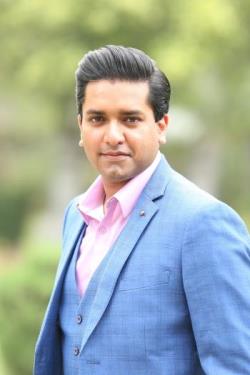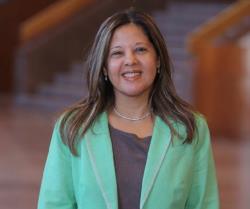Harnessing AI for Sustainable Development Goals in the Arab Region
UNDP Egypt
Session 525
Introduction:
While 2030 Agenda for Sustainable Development approaches its deadline, more than half of the globe is left behind. Despite increased knowledge and commitment to the Sustainable Development Goals (SDGs), progress has been slow. According to the SDG Progress Report 2023, only 12% of the Sustainable Development Goal are on track, progress towards 50% is inadequate, and 30% of the SDGs were paused or reversed.
Despite disparities at the country level, the Arab Region is falling behind on many SDGs, and it is very likely that the region will not achieve all the SDGs by 2030 if the current trends persist. Many countries in the region remain trapped in a vicious cycle of low productivity and stagnant human development, which is worsened by the conflict in the region.
Artificial Intelligence (AI) has emerged as a powerful tool in advancing the SDGs. If deployed efficiently and ethically, AI has the potential to create inclusive and sustainable growth and improve lives through a responsible application in many sectors including health, education, climate change, water, food and energy.
The Arab Region has experienced tremendous technological transformation and innovation in the last decade. However, the Arab nations have distinct internal conditions, which are clearly reflected in their ambitions to adopt technological advancements, in particular AI, into their policies, strategies and institutions. Some countries in the region have acted quickly to adopt cutting-edge technology, institutions, standards, and strategies to localize and utilize AI, which has improved their worldwide rankings. On the other hand, other countries are still at the very early stage with no clear strategies for AI.
There is no doubt that AI provides enormous opportunity for governments in the region to drive economic growth, improve public services, and solve societal challenges. As estimated by PwC, the Middle East will accrue 2% of the total global benefits of AI in 2030, which is equivalent to US$320 billion. To harness this opportunity, there is a need to assess the position of the Arab countries in the global Artificial Intelligence race, identify challenges and opportunities, discuss cooperation potentials for the Arab countries make the necessary steps to be part of the technological disruption and contributors to the global AI technological advancement, and to harness the power of AI to develop fair and inclusive economically vibrant societies.
AI in the Arab Region:
The Arab Region has witnessed significant technological transformation and innovation over the past decade. However, the internal conditions of the Arab nations vary, influencing their ambitions to incorporate technological advancements, particularly AI, into their policies, strategies, and institutions. While some countries have swiftly adopted cutting-edge technology, others are still in the early stages of formulating clear AI strategies.
For instance, UNESCO has launched a series of regional seminars on developing national digital and AI competency frameworks to equip educators and learners with appropriate digital skills. The first seminar, organized in April 2024, focused on the Arab States and brought together some 400 participants from 80 countries, including 19 Arab States, showing a strong interest in the topic in the region and beyond.
Artificial Intelligence (AI) in Egypt has been growing rapidly, and the country has made significant strides in this field. According to the report on the readiness of world governments to implement AI technology for the year 2022, Egypt ranked second in Africa after Mauritius. It moved up 55 places on the Government Artificial Intelligence (AI) Readiness Index[i] to occupy the 56th rank out of 172 countries. The national strategy for artificial intelligence in Egypt is based on three main axes:
- Education and training;
- Harnessing big data and gaining insights for the implementation of mega projects;
- Making that data available to the private sector, an integral element in the growth of the Egyptian economy.
AI plays a crucial role in digital transformation, acting as a catalyst for solving environmental problems and transitioning to a green environment. The latest AI technologies are also used to build smart cities and transform existing cities into smart ones by international standards. Egypt aims for AI to compose 7.7% of its Gross Domestic Product (GDP) in 2030. Egypt is also hosting various events to explore the potential of AI in the Egyptian economy. These efforts reflect the high priority the Egyptian government currently attaches to AI. The rapid growth of AI and the digital ecosystem in Egypt promises a future filled with exciting opportunities.
Across the Arab region, AI offers governments in the region a tremendous opportunity to drive economic growth, enhance public services, and address socioeconomic challenges. According to PwC's estimates, the Middle East will receive 2% of the US$320 billion in global AI benefits by 2030[ii] The report also highlights that the greatest gains from AI are likely to be in the UAE and Saudi Arabia. The impact could be even larger if governments in the region continue to push the boundaries of innovation and implementation of AI across businesses and sectors. The annual growth in the contribution of AI is expected to range between 20-34% per year across the region, with the fastest growth in the UAE, followed by Saudi Arabia. The magnitude of the impact expected in these two economies is unsurprising given their relative investment in AI technology compared to the rest of the Middle Eastern region. Both countries place within the top 50 countries in the world on the Global Innovation Index 2017 in terms of their ability to innovate and the outputs of their innovation.
To harness this opportunity, it is crucial to assess the position of the Arab countries in the global AI race, identify challenges and opportunities, discuss potential cooperation for the Arab countries, and take the necessary steps to contribute to global AI technological advancement.
Objectives of the session:
- Introduce the groundbreaking initiatives by the UNDP that are propelling digital transformation across the Arab Region
- Present a case study from Egypt, showcasing how AI is being harnessed to fast-track the Sustainable Development Goals (SDGs).
- Highlight the common challenges facing the adoption of AI in the Arab region.
- Discuss the opportunities and a roadmap for the advancement and utilization of AI in the Arab region to accelerate the achievement of SDGs.
Agenda:
9:00- 9:05 Keynote Speaker
Mr. Alessandro Fracassetti, Resident, UNDP Resident Representative, UNDP Egypt. AI: a driver for shared prosperity?
9:05- 9:15 Dr. Ahmed Tantawy, Senior Advisor to the Minister of ICT and the Director of Applied Innovation Center, Ministry of ICT, Egypt
AI for accelerating the achievement of SDGs: Egypt case study,
9:15- 9: 35 Fireside chat with panelists
Mr. Syed Mohammad Shaharyar Jawaid, Senior ICT Specialist.
Islamic Development Bank
Ms. Diane Mievis, Director of Global Policy and Government
Affairs, CISCO
9:35- 9:45 Q&A
Moderator:
Dr. Abeer Shakweer, Assistant Resident Representative, UNDP, Egypt.
[i] oxfordinsights.com
[ii] https://www.pwc.com/m1/en/publications/potential-impact-artificial-intelligence-middle-east.html

Alessandro Fracassetti has over 25 years of leadership experience in international organizations and since Nov 2021 is the UNDP Resident Representative to Egypt. This follows his role as the UNDP Resident Representative to Azerbaijan from 2018 to 2021. He has dedicated over two decades to senior management roles within UNDP, including also Deputy Resident Representative in Azerbaijan, North Macedonia, and Croatia, and Assistant Resident Representative in Belarus. Previously, he served with the Organization for Secuirty and Cooperation in Europe OSCE), as Senior Election Officer and Senior Political Advisor in Bosnia and Herzegovina and Spokesperson in Croatia.
Mr. Fracassetti holds a Master’s degree in politics and administration of the European Union, a B.A. in International Relations, and a Certificate of Political Studies from IEP Strasbourg and has extensive expertise on EU affairs, Eastern Europe, the former Yugoslavia, and the Middle East.

Dr. Ahmed N. Tantawy is a lifelong learner and educator, an engineer, an inventor, a scientist, and a former senior business executive. He enjoys conceiving, planning, structuring, and managing innovation ecosystems and effective organizations that are centered around people and purpose.
Since 2013, Dr. Tantawy has been serving as an expert advisor to multinational corporations, the World Bank, the UN and various government agencies. He is currently a senior advisor to the Egyptian Minister of Communications and IT and the Founding Director of the Applied Innovation Center, where national challenges are addressed through the application and adaptation of emerging technologies. He is also a member of the Board of Directors of various national scale initiatives in the Middle East, a member of the Board of Directors of Telecom Egypt’s Data Services company, and a Trustee of two Not-for-Profit Organizations working in the fields of Education and Sustainable Social Development of underprivileged communities. He was a member of the Board of Directors and the Executive Committee of the Egyptian National
Telecommunications Regulatory Authority, a member of the Executive Committee for the Development of the Suez Canal Region, a senior advisor to various cabinet ministers, the Executive Director of an international Nanotechnology initiative, and a principal investment advisor of a Venture Capital fund operating in the US and the Middle East.
Dr. Tantawy held several technical and executive positions at IBM Corporation. From 2008 to 2013, he was Chief Technical Officer and Senior Executive Advisor in the Growth Markets Region, where he oversaw the company’s mega-projects in Central and Eastern Europe, Central and South America, Africa, Asia, and Australasia. From 1996 to 2008, he was the CTO of IBM’s Telecom and Media Industry Solutions Unit then the entire Internet Division, directing Product Development Labs in the US, UK, Germany, Italy, Japan, Brazil, and Egypt.

Shaharyar Jawaid is a Global Technology for Development Expert and has over 15 years of professional experience and learning in International Development, IT/Telco industry, Investment Advisory, International Public Speaking and successfully leading, developing, and managing development programs in over 20 countries across 5 continents.
Shaharyar is an experienced international development professional and currently looks after the IsDB’s ICT policy and strategy for its engagement in the ICT sector in the Bank’s 57 Member Countries. With over a decade of experience from around the world, Shaharyar is recognized as a Public Speaker and regularly organizes, and hosts webinars and events related to Digital & Financial Inclusion particularly with focus on emerging technologies and digital transformation.
Shaharyar started his professional career at Vodafone Group Services in Newbury, UK at Vodafone HQ in 2008 where he served as a Data Analyst. He has also served at the Islamic Development Bank (IsDB), Jeddah, KSA at various positions with the current being Senior ICT Specialist. He has been responsible for managing numerous infrastructure projects relating to telecommunication systems, fibre optic cables, submarine cables, e-government.

Diane Mievis leads strategic public policies for Cisco in the European Union, including telecoms, sustainability and trade policies. Diane joined Cisco in May 2021 and is based in Brussels. Diane has over 15 years of diverse experience across government and technology public affairs. Prior to joining Cisco, she was Senior Manager at Samsung, she also held various postings in the Cabinets of two Ministers of the Walloon Government in Belgium
Diane is Chair of the Green Transition Working Group of Tech Industry association DIGITALEUROPE and also Vice-Chair of the Digital Economy Committee of AmchamEU, representing US companies in the European Union.
Diane holds a Master in Political Sciences and European Studies from the University of Liege, and an Executive MBA from the Vlerick Business School (Belgium).

Abeer Shakweer is currently the Assistant Resident Representative and the Inclusive Growth and Innovation team leader at UNDP Egypt. She is responsible for digital transformation, SMEs and entrepreneurship, youth, innovation, and governance. She holds a Ph.D., in Environmental Engineering and a M.Sc. in Computer Science both from the University of Nottingham, in the UK, and a B.Sc. in Chemical Engineering from Cairo University.
Dr. Shakweer has more than 20 years of experience in ICT, Technology Transfer, Innovation, and entrepreneurship, working with national and international organizations. She worked as the advisor to the Egyptian Minister of Communication and Information Technology; and the Founding Executive Director of the National ICT academy for Persons with Disabilities.
She previously worked as the founding Planning and Monitoring Manager and head of International Cooperation at the Science and Technology Development Fund, and the Executive Director for the center for future studies at the Egyptian Cabinet of Minister’s Information and Decision Support Center. Dr. Shakweer worked as a consultant with several reputable international organizations including the European Commission, and several UN agencies.
Dr. Shakweer received several international awards including the WSIS, Best UK universities alumni, the world innovation, technology, and services alliance award and the 100 communications and information technology officers award.
-
 C1. The role of governments and all stakeholders in the promotion of ICTs for development
C1. The role of governments and all stakeholders in the promotion of ICTs for development
-
 C4. Capacity building
C4. Capacity building
-
 C7. ICT applications: benefits in all aspects of life — E-government
C7. ICT applications: benefits in all aspects of life — E-government
-
 C7. ICT applications: benefits in all aspects of life — E-health
C7. ICT applications: benefits in all aspects of life — E-health
-
 C7. ICT applications: benefits in all aspects of life — E-agriculture
C7. ICT applications: benefits in all aspects of life — E-agriculture
-
 Goal 2: End hunger, achieve food security and improved nutrition and promote sustainable agriculture
Goal 2: End hunger, achieve food security and improved nutrition and promote sustainable agriculture
-
 Goal 3: Ensure healthy lives and promote well-being for all
Goal 3: Ensure healthy lives and promote well-being for all
-
 Goal 8: Promote inclusive and sustainable economic growth, employment and decent work for all
Goal 8: Promote inclusive and sustainable economic growth, employment and decent work for all
-
 Goal 9: Build resilient infrastructure, promote sustainable industrialization and foster innovation
Goal 9: Build resilient infrastructure, promote sustainable industrialization and foster innovation
-
 Goal 16: Promote just, peaceful and inclusive societies
Goal 16: Promote just, peaceful and inclusive societies